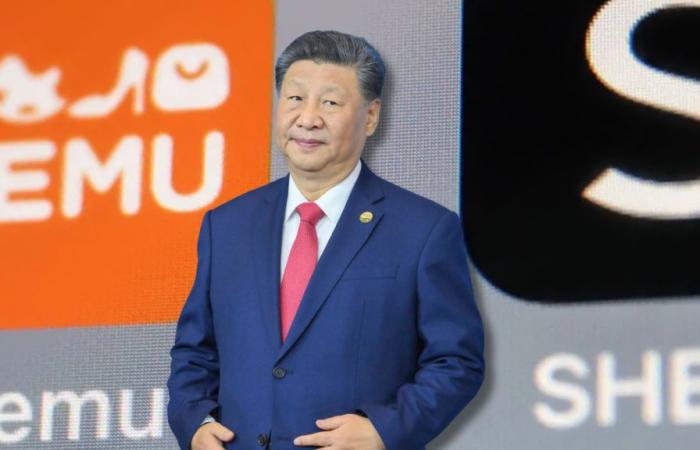On the Chinese platforms Temu, Shein or Alibaba, Swiss consumers find goods from China’s communist planned economy.
Niklaus Vontobel / ch media
More from “International”
Prices for Chinese goods are incredibly low. Online platforms like Temu, Shein or Alibaba offer sneakers for 5.93 francs, dresses for 6.99, slippers for 7.51 and autumn coats for 21 francs. Crazy prices for this type of consumer product. Solar panels or Chinese electric cars are also very cheap. But why are these prices so low?
This is a consequence of the communist planned economy in China. This is what emerges from an analysis that researcher Zongyuan Zoe Liu, from the American think tank “Council on Foreign Relations”, wrote for the magazine Foreign Affairs. Liu explains why the Chinese system is about to fail, but will not be replaced. It also reveals its monumental side effects.
Beijing places industry above everything else. The head of government Xi Jinping wants to produce, produce and produce. On the other hand, he is less interested in knowing whether the goods which then leave the factories will be consumed. For Beijing, consumption is a waste of resources, an “individualistic distraction”.
The government takes money from households and gives it to industry – so that industry can build even more factories. Beijing carries out this redistribution by artificially pushing wages down. This lowers the interest the Chinese receive from their banks, creating cheap money that can be pumped into favored industries. In the end, even more goods are coming off the assembly lines.
Consumption must serve Chinese industry
And if there is consumption, this must, according to Beijing’s wishes, serve industry. This is what the government declared in a paragraph of its five-year plan, amid detailed objectives on patents or economic growth. Consumption must therefore be oriented towards goods that correspond to industrial objectivesfor example cars, electronics or smart devices.
According to Liu, this goes so far that China’s entire retail industry is “primarily influenced by the state’s industrial goals – not people’s individual preferences.” This also applies to the online platforms of Shein, Alibaba and Pinduoduo, of which Temu is a part. There is only the illusion of a great choice. In reality, these distributors would compete fiercely to sell the same interchangeable standard products.
All this control and management has a clear consequence, that the Wall Street Journal described as follows: “China produces too many things”. Too much for herself, sometimes even too much for the whole world.
The country has too much glass and too much coal, too much cement and too much aluminum. Its factories can potentially produce as many electric cars as the world can use in a year, and twice as many solar panels.
This can be explained in particular by the fact that private households are kept away by Beijing – and therefore do not have the money necessary to buy everything that comes off Chinese assembly lines. Abroad therefore inevitably becomes the dumping ground for Chinese overproduction.the price then playing only a secondary role. The main thing is that we can still get money for all these goods.
Crazy competition between bureaucrats
The United States has long understood this twisted logic, like Lael Brainard, chief economic advisor to Joe Biden’s government. In a speech, she warned that China was pursuing a policy that “unfairly pressures the costs of capital, labor and energy.” This would allow Chinese companies to sell “at or below cost”. In other words, Beijing is pushing private incomes down – which is why it can flood the world with cheap goods.
The glut in China is therefore created by order from above, from Beijing. But there is another reason for this flood of goods: misdirected incentives within the communist political system.
Beijing exerts enormous pressure on local leaders in cities and provinces, notably through industrial plans imposed from above or campaigns such as “common prosperity”. Those who achieve goals move up the career ladder, while those who fail stagnate or are demoted. So leaders comply, actively directing savings and subsidies to favored industries – no matter if there are buyers for those products, no matter if other regions are doing the same thing.
This is how spectacular competitions between Chinese provinces beginfrom west to east, from north to south. All – or almost – want to build even more factories, and even faster, in the same industries favored by Beijing.
Chinese solar panels as an example
This is what happened with photovoltaics. Beijing made it a priority in 2010: 31 out of 34 provinces followed, half of the cities invested and there was soon a glut of solar panels. Overseas unloading has started. In 2013, the United States fought back, imposed tariffs and that helped, but only temporarily.
In 2023, they realized that Chinese manufacturers were accessing their market without paying customs duties, by taking a detour through Thailand or Vietnam. Currently, China can produce twice as many panels as the world needs. Yet, by 2025, it will have increased its capacity by another 50%.
In the West, reactions are becoming more and more numerous. The European Commission is, for example, examining whether online retailer Temu is doing enough against goods that contravene EU rules. New US President Donald Trump has threatened to impose 60% tariffs on Chinese goods.
But Beijing will not abandon its system anytime soon, particularly because it makes private companies docile. Many of them have to sell their goods at such low prices that their financial situation is extremely precarious. Without advantageous credits from Beijing, they will collapse. Credits that can be cut at any time.
The news in Switzerland is here
Show all articles
Translated and adapted from German by Léon Dietrich






